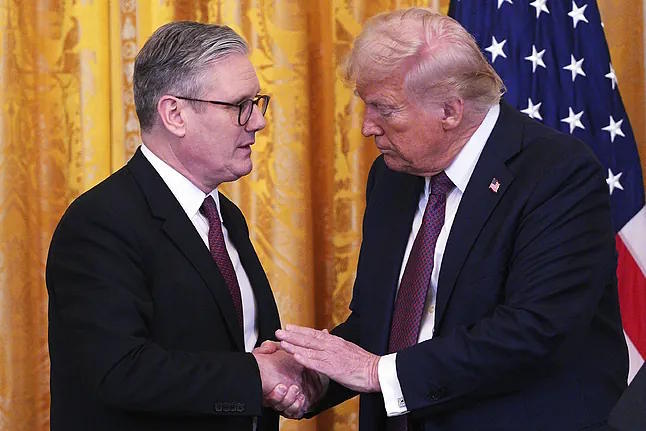The UK is set to become the first country to sign a trade agreement with the United States after Washington launched its tariff war on April 2. Exactly one month ago, on April 9, Donald Trump reduced the tariff increase for all countries except China to 10% and announced a 90-day period to reach new trade agreements with all countries worldwide. The Trump administration's stated goal is to reach agreements with 17 trading partners by July 9.
For the UK, this is the second trade agreement achieved by Prime Minister Keir Starmer's government in a week, following the one with India a few days ago.
The agreement is very limited as it does not eliminate the base tariffs of 10% set by Trump and applicable to all goods imported by the US. In the absence of specific details, everything indicates that it will be limited to establishing quotas for the import of steel and automobiles from the UK that will be exempt from the 25% tariff that Trump imposed on these sectors on March 12. The dimensions of these quotas are unknown at this time, and whether the products included in them will be exempt from tariffs, revert to the pre-March 12 tariffs, or receive a higher but lower than 25% duty is also unclear. Apparently, aluminum, which also received a 25% tariff, is not included in the agreement. 10% of British aluminum exports in 2024 went to the US.
On the UK side, the main concession is a softening, for which there are no details, of its Google tax, which is very similar to the Spanish one. The British Digital Services Tax (DST) taxes 2% of the revenue generated in the UK by companies that globally generate £500 million (¤588 million) and operate social networks, online search engines, or online retail sites, provided that they have a turnover in that country exceeding £25 million (¤29.4 million).
The tax primarily affects US companies and, based on revenue rather than profits, has a greater impact. The DST came into effect in April 2020 when the Conservative Party was in power and has raised more revenue than expected. Although neither the British Treasury nor the companies provide segregated figures on who pays it, it is estimated that five US companies - Apple, Meta, Microsoft, Amazon, and Alphabet - contribute more than 80% of the total revenue. Silicon Valley is very close to the Donald Trump administration, which they have tried to influence to abandon antitrust proceedings affecting these companies and to pressure European countries to eliminate the Google tax and not apply EU regulations.
Additionally, the agreement includes greater market access in the UK for US agricultural products. According to the London government, this does not include US food, especially hormone-treated beef and chlorine-washed chicken. The pharmaceutical sector is also not included in the agreement, despite London's efforts regarding the US investigation into the commercial practices of that industry. Likewise, another British priority, the aerospace industry, seems to have been left out.
For the Keir Starmer government, the agreement holds significant political significance as the Prime Minister has invested a considerable amount of political capital in maintaining a good relationship with Donald Trump, which includes frequent phone conversations and inviting him for a second State visit to the UK, something unprecedented in the history of relations between the two countries. The agreement also comes less than two weeks before the summit between the UK and the EU, which could seal the reconciliation between London and Brussels after Brexit.
However, the potential loss of tax revenue resulting from changes in the DST could further limit the fiscal maneuverability of the Labour government, especially as it is considering reversing some of its austerity measures following the spectacular victory of Nigel Farage's far-right Reform Party in last Friday's elections. Likewise, the coffin containing the idea of a free trade agreement between the UK and the US, one of the dreams that inspired Brexit, receives a few more nails with this pact.
For Trump, the propaganda effect is evident, although the actual commercial impact will be minimal.
